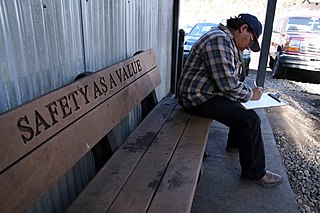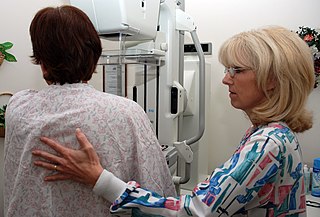Related Research Articles

Clinical chemistry is a division in medical laboratory sciences focusing on qualitative tests of important compounds, referred to as analytes or markers, in bodily fluids and tissues using analytical techniques and specialized instruments. This interdisciplinary field includes knowledge from medicine, biology, chemistry, biomedical engineering, informatics, and an applied form of biochemistry.

Prostate cancer is the uncontrolled growth of cells in the prostate, a gland in the male reproductive system below the bladder. Early prostate cancer usually causes no symptoms. As the tumor grows, it can damage nearby organs causing erectile dysfunction, blood in the urine or semen, and trouble urinating. Some tumors eventually spread to other areas of the body, particularly the bones and lymph nodes. There, tumors cause severe bone pain, leg weakness or paralysis, and eventually death.

Prostate-specific antigen (PSA), also known as gamma-seminoprotein or kallikrein-3 (KLK3), P-30 antigen, is a glycoprotein enzyme encoded in humans by the KLK3 gene. PSA is a member of the kallikrein-related peptidase family and is secreted by the epithelial cells of the prostate gland.

Digital rectal examination (DRE), also known as a prostate exam, is an internal examination of the rectum performed by a healthcare provider.

Roswell Park Comprehensive Cancer Center is a cancer research and treatment center located in Buffalo, New York. Founded by surgeon Roswell Park in 1898, the center was the first in the United States to specifically focus on cancer research. The center is usually called Roswell Park in short. The center, which conducts clinical research on cancer as well as the development new drugs, provides advanced treatment for all forms of adult and pediatric cancer, and serves as a member of the National Comprehensive Cancer Network. Roswell Park Comprehensive Cancer Center is as of 2019, the only upstate New York facility to hold the National Cancer Institute designation of "comprehensive cancer center".
Samuel Ray Denmeade is a Professor of Oncology, Urology and Pharmacology and Molecular Sciences at the Johns Hopkins University School of Medicine. Over 10 of his published papers have each been cited over 100 times.

Screening, in medicine, is a strategy used to look for as-yet-unrecognised conditions or risk markers. This testing can be applied to individuals or to a whole population without symptoms or signs of the disease being screened.
Prostate cancer screening is the screening process used to detect undiagnosed prostate cancer in men without signs or symptoms. When abnormal prostate tissue or cancer is found early, it may be easier to treat and cure, but it is unclear if early detection reduces mortality rates.
The United States Preventive Services Task Force (USPSTF) is "an independent panel of experts in primary care and prevention that systematically reviews the evidence of effectiveness and develops recommendations for clinical preventive services". The task force, a volunteer panel of primary care clinicians with methodology experience including epidemiology, biostatistics, health services research, decision sciences, and health economics, is funded, staffed, and appointed by the U.S. Department of Health and Human Services' Agency for Healthcare Research and Quality.

Rick Antonius Kittles is an American biologist specializing in human genetics and a Senior Vice President for Research at the Morehouse School of Medicine. He is of African-American ancestry, and achieved renown in the 1990s for his pioneering work in tracing the ancestry of African Americans via DNA testing.
Donald F. Gleason was an American physician and pathologist, best known for devising the "Gleason score" which predicts the aggressiveness of prostate cancer in patients. He was a former chief of pathology at the Minneapolis VA Medical Center, and received three degrees from and taught at the University of Minnesota.

Cancer screening aims to detect cancer before symptoms appear. This may involve blood tests, urine tests, DNA tests, other tests, or medical imaging. The benefits of screening in terms of cancer prevention, early detection and subsequent treatment must be weighed against any harms.
Joe G. N. "Skip" Garcia is an American pulmonary scientist, physician and academician.
Specimen provenance complications (SPCs) result from instances of biopsy specimen transposition, extraneous/foreign cell contamination or misidentification of cells used in clinical or anatomical pathology. If left undetected, SPCs can lead to serious diagnostic mistakes and adverse patient outcomes.
Overscreening, also called unnecessary screening, is the performance of medical screening without a medical indication to do so. Screening is a medical test in a healthy person who is showing no symptoms of a disease and is intended to detect a disease so that a person may prepare to respond to it. Screening is indicated in people who have some threshold risk for getting a disease, but is not indicated in people who are unlikely to develop a disease. Overscreening is a type of unnecessary health care.
Andrew Julian Vickers is a biostatistician and attending research methodologist at Memorial Sloan Kettering Cancer Center. Since 2013, he has also been professor of public health at Weill Cornell Medical College. He is the statistical editor for the peer-reviewed journal European Urology.
Kevin M. Slawin is an American physician and the founder of Bellicum Pharmaceuticals and the Vanguard Urologic Institute at Memorial Hermann Medical Group. He was also the Director of Urology at Memorial Hermann Hospital. Slawin specializes in the diagnosis and treatment of urologic cancers and robotic surgery. He is also possesses patents related to the advancement of prostate cancer diagnosis, staging and treatment and to the cellular immunotherapy of cancer.

Ronald S. Weinstein was an American pathologist. He was a professor at the University of Arizona College of Medicine-Tucson. Weinstein served for 32 years as an academic pathology department chair, in Chicago, Illinois and then Tucson, Arizona, while also serving as a serial entrepreneur engaged in university technology transfer.

Piflufolastat F-18, sold under the brand name Pylarify among others, is a radioactive diagnostic agent used for positron emission tomography (PET) imaging. It is given by intravenous injection.
References
- ↑ Should Men Get PSA Tests to Screen for Prostate Cancer?, Wall Street Journal, Feb 14, 2013
- ↑ University of Arizona College of Medicine – Tucson Department of Pathology profile. "Archived copy". Archived from the original on 2021-01-22. Retrieved 2019-09-04.
{{cite web}}: CS1 maint: archived copy as title (link) CS1 maint: bot: original URL status unknown (link). - ↑ Prostate cancer test has been misused for money, New Scientist, Feb 12, 2014
- ↑ Kotulak, Ronald. "A healthy sex life is, well, good and healthy", Chicago Tribune , Chicago, Illinois, 135th year, number 256, September 13, 1981, section 1, page 18. (subscription required)
- ↑ "Arizona Cancer Center staffer publishes 4th Book", Tucson Citizen , Tucson, Arizona, volume 137, number 250, October 18, 2007, Calendar section, page 25. (subscription required)